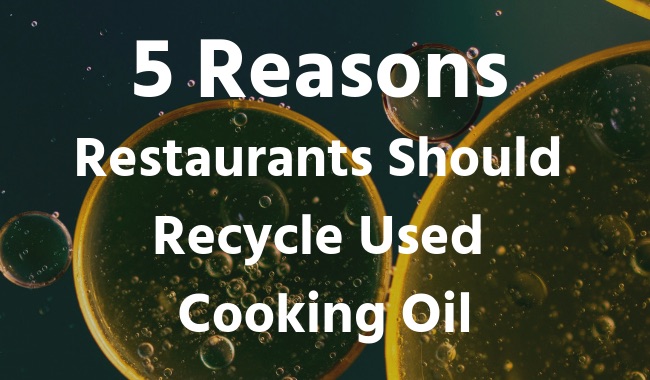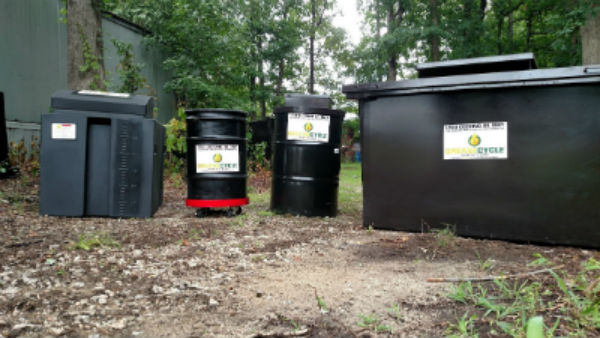
There is no denying it. Many of us have things we do every day that hurt the environment. Perhaps the most common habits include:
- Using plastic bags
- Sending recyclables to landfill sites
- Leaving the tap running
- Wasting paper
- Leaving the lights on
- Pouring harmful substances down the drain
While this list is by no means exhaustive, one thing that often goes under the radar is used cooking oil. Because of the way oil spreads, even a small quantity can cause environmental harm.
It’s estimated that there are almost 650,000 restaurants in America alone. All these restaurants use huge volumes of cooking oil every single day. Without the right cooking oil disposal procedures, such used oil is bound to have negative consequences on our environment.
Luckily, restaurants have an easier solution when it comes to used cooking oil. They can easily recycle used it. There are a lot benefits that come from purifying used cooking oil.
In this article, we’ll share 5 reasons why.
Reasons for Cooking Oil Recycling
1. Helps reduce waste.
By recycling used cooking oil, you’ll help reduce waste tremendously. At low temperatures, used cooking oil solidifies into chunks. These chunks can end up clogging your drain pipe and sewage system.
Besides, it’ll also cause you a number of inconveniences. One, water will not be able to properly flow down the drain. As such, you’ll be forced to call a plumber. And two, the sewer down the street may begin spewing its unsightly contents onto the street itself.
Not only can this render your restaurant inoperable, but this can also cost you a tidy sum of money to repair.
2. It can benefit local businesses.
Many restaurants are getting involved with cooking oil recycling. It is growing each day as an increasing number of restaurants realize the benefits.
In fact, in 2017, these restaurant oil recycling companies generated a whopping $4 billion in revenue. This amount is projected to rise even further as more and more restaurants join the recycling bandwagon.
In addition, the companies that specialize in recycling used cooking oil can help support the local economy. A study found that for every 100$ spend with local companies, 68$ was kept within the local community.
That extra money can help create new jobs, lower costs, and provide an economic stimulus for new businesses to come up.
3. Used cooking oil can be recycled into biodiesel.
One main reason for recycling cooking oil is to make fuel. Biodiesel is a renewable alternative to petroleum-based diesel fuel. Most U.S. biodiesel is produced from resources such as soybean oil, and waste cooking oil. Biodiesel can be useful for heating buildings as well as powering vehicles.
Using biodiesel helps reduce carbon dioxide emissions. This ultimately helps reduce greenhouse gas emissions. Moreover, it helps reduce reliance on foreign oil resources.
4. Helps protect the environment.
Meteorologists all around the world are raising the red flag over rising temperatures. One key factor that is contributing to this problem is greenhouse gas emissions.
These emissions arise mostly from the use of modern transport systems like ships, trains, aircraft, and vehicles.
This has led some countries to establish strict laws regarding greenhouse emissions. But while others are taking action, some are rather reluctant to curb the problem. As a result, this has led to increased emissions including carbon dioxide and methane – two gases that strongly compromise the integrity of the ozone layer.
By using biodiesel, greenhouse gas emissions can greatly be reduced.
5. Recycling used cooking oil is cost-effective.
Properly disposing of used cooking oil is a clear win for restaurant owners in terms of savings. Cooking oil disposal companies usually charge an average of $35 for collection.
That cost excludes things like costs of storing and managing the oil, and working hours. By recycling your cooking oil, you’ll not only cut these costs, but you’ll also get paid for doing so.
Your oil recycling company will pick up your used cooking oil and take it for recycling. So besides being a cost-effective solution, this may also be an easier solution for you and your business.
How to properly dispose of used cooking oil in your restaurant
- Arrange for collection of your used cooking oil from a reputable organization. Their online ratings should be able to tell you a thing or two about their services.
- Seek advice from your local Building Control Department and Environmental Health Office.
- Avoid disposing of your used cooking oil in the general waste stream or with the rest of your kitchen waste.
- Store containers holding used cooking oil in a secure area away from all drains to prevent spills and leakages into the sewage system.
- Collect waste fats, oils, and grease in air-tight containers to prevent odors and infestation by vermin. There are countless options online to help you store your used cooking oil properly.
- Use a grease trap and empty it on a regular basis. Most used oil recycling companies also include grease trap cleaning services in their package.
- Avoid pouring waste fats, oils and grease down drains and sewers. Doing so can create obstructions in underground pipes and cause costly, unpleasant sewer blockages.
- Train your staff on the importance of keeping fat, oil, and grease out of drains and sewers.
How to choose an oil recycling company for your restaurant
Not all used cooking oil collection and recycling companies are created equal. As such, it’s important to do your research prior to hiring one. The following are some questions that can help you pick the right one for your restaurant needs:
- Is your company certified by the department of environmental quality?
- Are your collections regular and reliable?
- How will you ensure that you provide the least disruption to our company?
- For how many years have you been providing used cooking oil recycling services?
- How much do you pay per barrel of used cooking oil?

As you can see, recycling used cooking oil provides many benefits to restaurant owners. Recycling that yellow oil does not only boost your restaurant’s green credibility, but it may also be able to turn a profit for you. So don’t put it down the drain or throw it away!
